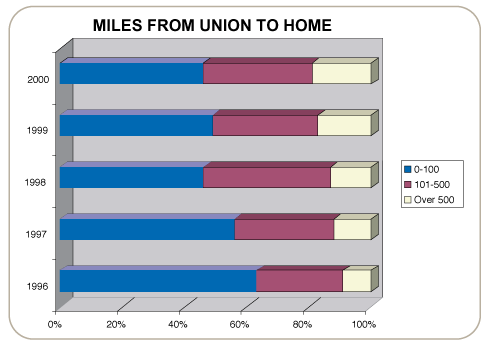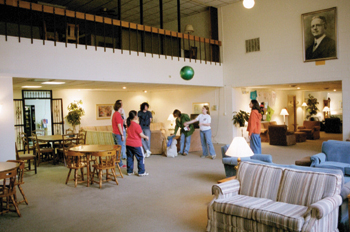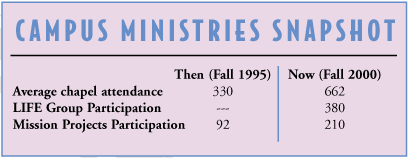What would you do with 1,555,200 minutes, or 25,920 hours? Amazingly,
that is what the average college student spends outside the classroom
over eight semesters.
Considering the enormous amount of time students spend outside the
classroom, it’s no wonder Union has such a strong commitment to
student development. And, over the past five years, that commitment has
grown stronger.
When freshmen come to Union, most expect to receive a top-rate
education. However, student life research shows that education extends
beyond the classroom. Students spend as much as 90 percent of their time
in college outside of the classroom, according to Kimberly Thornbury,
Union's Dean of Students. That time may be spent in residence complexes,
with various student organizations, on the intramural fields, or in one
of many ministry opportunities.
Recognizing that reality, Union's Office of Student Services and the
Office of Campus Ministries have made a commitment to provide
opportunities to have fun, to grow, and to be a part of the community.

Jay Ridenhour, Director of Discipleship Ministries, discusses the challenges of
leadership with students attending one of the Leading U workshops.
Developing leaders
Student Services is responsible for planning activities and programs for
Union students. Many changes have taken place, including several new
staff members. In fact, over 80 percent of the staff have been employed
since 1996. That staff, under the leadership of Thornbury, continues to
actively create a strong vision for shaping students while at Union.
"I'm proud of the team we've developed,” says Thornbury. “You
could not find a group more committed to working with and developing
students.”
Planning events is just one focus for Student Services. One of the
most successful events is Family Weekend. Coming up on its fourth year
this October, Family Weekend provides an opportunity for families to
visit, relax and have a little fun on campus.
 Concerts,
intramural sports, a wellness center, and other special events also give
students a break from their studies. Concerts,
intramural sports, a wellness center, and other special events also give
students a break from their studies.
The university has also implemented programs to get students
involved, keep them connected, and add convenience. The Dawg Tag and
Sic'Em Card are two new additions. The Dawg Tag is a student
identification card with debit feature that came online in 1999.
Students use their Dawg Tags in all of the usual ways. However, this new
system also allows them to scan the card for chapel credit and use the
debit feature in the cafeteria, the Lexington Inn, and the bookstore. In
the future, vending machines could even be equipped to read the card.
When students arrived on campus this fall, they found Mascot.com.
Mascot is an internet site specifically for Union students. With an
announcement board, online groups, and e-mail features, students can
find out what is happening on campus and connect with those of similar
interests.
The goal of Student Services, however, extends beyond providing basic
services.
“As a university we want to equip and empower students to be
leaders when they leave here,” explains Stephanie Lee, director of
student leadership development. “We want students to be comfortable
dealing with time management, conflict resolution, communication issues,
and the many other situations that occur in the workplace.”
It was out of that vision that Leading U was developed to take a
proactive role in training students. Over 200 student leaders were
invited to participate during the fall. The juniors and seniors selected
were already in leadership positions with student government, in
residence life, as student ambassadors, as Life
Group leaders, and in many other campus organizations.
The support from all the faculty and staff made the program a
success, according to Lee. Dr. Dockery talked with the group about
grace-filled leadership and making wise decisions. Many other faculty
and administrators participated in roundtable discussions and made
presentations.
“Students need to know that they are appreciated and that as a
university we support the development of their leadership skills,”
says Lee. “Sometimes students feel disconnected with the
administration. Programs like Leading U help bridge that gap and provide
positive role models for students.”
Union senior and former student government president Joshua Trent
agrees. “Programs like Leading U provide an opportunity for students
to talk openly and honestly with administrators, faculty and staff about
the daily challenges of leadership. The emphasis on student leadership
benefits the entire university community.”
That commitment to being involved in students' lives can be seen from
the top level of the administration.
“Dr. Dockery really sets the tone for the commitment to student
development,” says Thornbury. “He is at ballgames, intramural games,
and knows students by name when he sees them in the hall. That is a true
blessing to Union's students.”

The residence complex commons areas have become the center of residential life.
More than a place to sleep
“On average, a college student will spend 18 hours in the classroom
which leaves 150 hours each week to be spent each week outside of the
classroom,” said Kathy Southall, director of residence life.
“Researchers in student development confirm that the majority of
growth in college students takes place where the students 'hang their
hats,' which is in residence life.”
Most Union students begin and end each day in the residence
complexes. They sleep, eat, laugh, cry, play and even study in their
little home away from home. The residence life staff sees this time as
an opportunity to help students develop values and apply the principles
being taught throughout the university.
“The residence directors, residence staff advisors, and resident
advisors could be called translators,” says Southall. “We want
students to learn that faith cannot be compartmentalized. The things
they are learning in the classroom or chapel should be lived out in
daily life. Residence life provides an environment for students to
practice what they learn.”
With a combined 22 years of experience in student development and
three master's degrees, the professional staff has transformed residence
life over the past five years. In addition to Southall, the staff
consists of three residence directors, six students serving as residence
staff advisors, and 27 student resident advisors. The staff is actively
involved in planning activities and spending time with the residents.
“The commons area used to just be a place to watch television. Now
students are using the areas for planned activities and building
relationships,” explains Southall.
Watterstock was a standing room only event held in the Watters
complex. Several of Union's student bands performed while hundreds of
students sipped on Cappuccinos and consumed an unthinkable amount of
pizza for almost seven hours.
When a Clue game was held in the commons, several faculty and staff
members – including Dr. Dockery – dressed up as the infamous board
game characters to provide students with clues. Based on the traditional
mystery game, each building had to gather the clues to figure out the
guilty culprit. From having to sing the alma mater to finding chocolate
bribes, getting the clues were sometimes easier said than done.
“It is great to see faculty and staff involved with residence life,”
says Southall. “Most of the time students see these people in their
typical 8-to-5 roles. Activities like Clue are a great opportunity for
students to connect with faculty and staff.”
“We want students to learn responsibility,” says Southall. “Instead
of giving students a long list of don'ts we ask students to follow five
university-wide community values. Those values include worth of self,
self-discipline, academic and personal integrity, respect for property
and the environment, and respect for the community authority.”
A heart for ministry
“We judge success by how well students are living and acting
Christianly, not how many are participating in various programs,” says
Todd Brady, Minister to the University.
The desire to meet students where they are is the foundation for the
Office of Campus Ministries. Integrating campus ministries with overall
campus life focuses on three areas: worship, discipleship and service.
 Worship
takes place in many ways, but none is more prominent on campus than
chapel. The approach to chapel has shifted to give students more
opportunities to lead. Chapels are held every Monday and Friday. Mondays
are usually more traditional. The sound of a praise band fills the
Friday chapel as students lead the time of worship. Worship
takes place in many ways, but none is more prominent on campus than
chapel. The approach to chapel has shifted to give students more
opportunities to lead. Chapels are held every Monday and Friday. Mondays
are usually more traditional. The sound of a praise band fills the
Friday chapel as students lead the time of worship.
Union students are also taking active roles in the area of
discipleship. Union students Kristen Wicker and Autumn Alcott had a
vision for a young ladies ministry. It was out of their vision that
Klemata was started. The student-initiated, student-lead Bible study
that meets weekly involves a large number of young women on campus.
“Autumn and I had a strong desire to start a ministry for young
women on this campus,” explained Wicker. “The administration was so
supportive and encouraged us to turn our vision into reality.”
Discipleship, however, goes beyond Bible study. In 1997, a
peer-mentoring program called LIFE Groups was started. The program
places freshmen into small groups led by two upperclassmen. Each group
focuses strongly on character development, success strategies, and
adjustment to college life. Over 90 percent of freshman join a LIFE
Group, which is a voluntary program.
“The LIFE Groups have had a positive impact on the university,
including retention,” says Brady. “Freshmen develop relationships
from the beginning of the college experience. The support system
established through the groups helps them to adjust to the challenges
and opportunities of college life.”
As with Life Groups, participation in other campus ministries has
increased dramatically. The number of students involved in Global
Opportunities (GO) trips has doubled over the last five years. The
number of sites for the mission trips has also increased including
international destinations such as Honduras, Costa Rico, Poland,
Morocco, Spain, Israel and Egypt.
“We are finding that students are hungry to be Christians and want
to learn more,” says Brady. “As a university, we want to provide
opportunities for our students to grow and learn to integrate their
faith with every aspect of life.” |



 Concerts,
intramural sports, a wellness center, and other special events also give
students a break from their studies.
Concerts,
intramural sports, a wellness center, and other special events also give
students a break from their studies.
 Worship
takes place in many ways, but none is more prominent on campus than
chapel. The approach to chapel has shifted to give students more
opportunities to lead. Chapels are held every Monday and Friday. Mondays
are usually more traditional. The sound of a praise band fills the
Friday chapel as students lead the time of worship.
Worship
takes place in many ways, but none is more prominent on campus than
chapel. The approach to chapel has shifted to give students more
opportunities to lead. Chapels are held every Monday and Friday. Mondays
are usually more traditional. The sound of a praise band fills the
Friday chapel as students lead the time of worship.